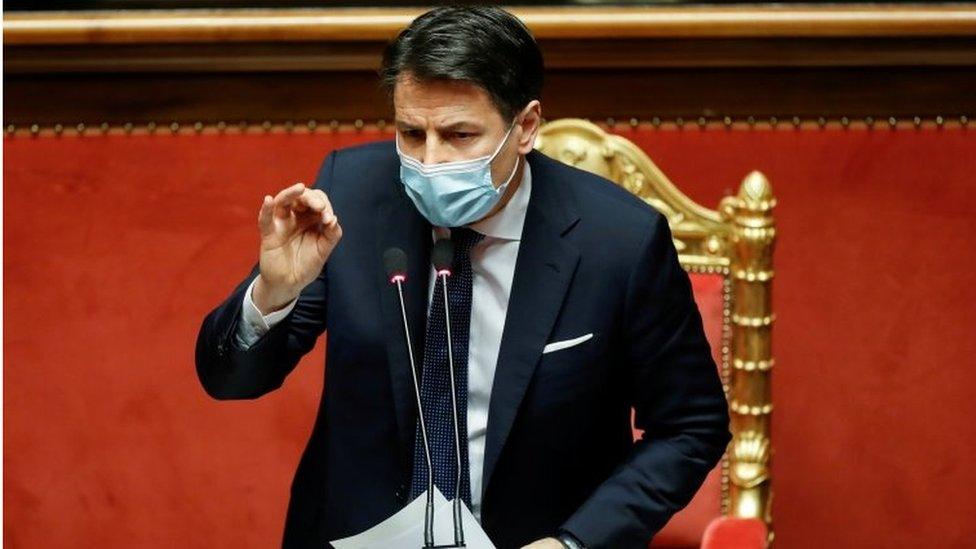Covid: Italian PM brands vaccine delay 'unacceptable'
- Published

Giuseppe Conte has vowed to take legal action against the two companies
Italian Prime Minister Giuseppe Conte says a delay in the supply of coronavirus vaccines from Pfizer and AstraZeneca is "unacceptable".
Both companies have warned they will not be able to deliver vaccines to the EU as agreed due to production issues.
Mr Conte has accused them of serious contract violations.
A senior Italian health official has warned that the country will have to rethink its vaccination programme if supply issues continue.
The AstraZeneca vaccine, developed by Oxford University, has not yet been given EU approval; however the bloc's drug regulator is expected to give it the green light at the end of this month.
A spokesman for AstraZeneca said on Friday that "initial volumes will be lower than originally anticipated" without giving further details.
Officials have not confirmed publicly how big the shortfall will be, but an unnamed EU official told Reuters news agency that deliveries would be reduced to 31m - a cut of 60% - in the first quarter of this year.
The drug firm had been set to deliver about 80m doses to the 27 nations by March, according to the official who spoke to Reuters.
Last week Pfizer announced it was slowing supplies to Europe to make manufacturing changes that will boost capacity. The EU has ordered 600 million doses from Pfizer.
On Saturday, Mr Conte wrote on Facebook: "Our vaccination plan ... has been drawn up on the basis of contractual pledges freely undertaken by pharmaceutical companies with the European Commission."
"Such delays in deliveries represent serious contractual violations, which cause enormous damage to Italy and other countries," he added.
The head of Italy's Higher Health Council Franco Locatelli said Pfizer deliveries were 29% lower than planned this week but the levels were expected to return to those agreed by 1 February.
Mr Conte vowed to use "all available legal tools".
Poland has also vowed to take action over the delay.
What is happening elsewhere in Europe?
Austrian media have reported that only 600,000 of 2m AstraZeneca doses promised by the end of March will arrive in the country on time, with the remaining 1.4m now being delivered in April.
A delay would be "completely unacceptable", Austrian Health Minister Rudolf Anschober said on Friday.
Allow X content?
This article contains content provided by X. We ask for your permission before anything is loaded, as they may be using cookies and other technologies. You may want to read X’s cookie policy, external and privacy policy, external before accepting. To view this content choose ‘accept and continue’.

Hungary's government, which has complained over the time it is taking EU regulators to approve the Oxford-AstraZeneca vaccine, has reached a deal with Russia to buy up large quantities of its Sputnik V vaccine, even though it has not received EU approval.
European Council President Charles Michel, who led a call with EU leaders this week, said on Thursday that officials were considering all ideas to try and stop future vaccine delays.
"All possible means will be examined to ensure rapid supply, including early distribution to avoid delays," he said.
European Commission President Ursula von der Leyen and Mr Michel both say they are still aiming for the target of 70% of the EU population being vaccinated by summer.
There has been criticism and frustration across the region about the speed of vaccination roll-outs.
Israel, the United Arab Emirates, the UK, and the US are all well ahead of EU nations in terms of doses given per capita so far.


The European Commission has co-ordinated orders for all member states, with vaccines then distributed based on their population size.
Vaccines are seen by public health experts as an important part of a route out of the Covid-19 crisis, with many European nations struggling to cope with a deadly surge of the virus over the winter period.
Covid vaccine safety: How does a vaccine get approved?

Borders to remain open
The total number of German Covid-19 deaths climbed above 50,000 on Friday - a day after the country warned that it could close its borders if other EU countries were less strict in controlling the virus. Berlin sounded the alarm amid rising concern about new variants.
EU leaders agreed late on Thursday to keep their internal borders open, external but warned non-essential travel might need to be restricted to curb the spread of the virus.
Ms von der Leyen said Thursday that more testing and "targeted measures" were needed throughout the EU in order to keep internal and external borders open.
For its part, France said it would impose tighter travel restrictions for European arrivals from Sunday, requiring a negative PCR Covid test within three days of travel.
In the Netherlands, a ban on all flights from the UK, South Africa and South American countries came into effect on Saturday to try and prevent new coronavirus variants gaining a foothold.
Looking ahead to the future, officials from EU nations reliant on tourism - including Spain and Greece - have floated the possibility of using vaccination certificates to allow for cross-border travel but there has been scepticism within the bloc.
Related topics
- Published22 January 2021